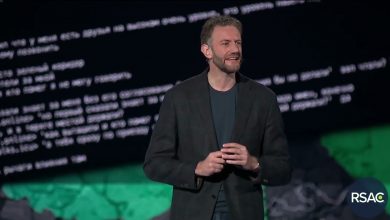The AI Cybersecurity Future is Here
AI will have a profoundly transformational impact upon cybersecurity, both in terms of how it is used by attackers and defenders.
 Via his informative Youtube video David Bombal states that the AI Cybersecurity future is here.
Via his informative Youtube video David Bombal states that the AI Cybersecurity future is here.
With expert guests he shares a comprehensive overview of this most significant transformation of the security industry driven by AI.
This covers topics including how AI will assist and augment current cybersecurity practices, concerns of personal data, AI in firewalls, ‘AI Hallucinations’ in ChatGPT, vendor innovations like Cisco EVE, the people shortage in cyber security and the career path in the future with AI.
A New Era of Cybersecurity
AI algorithms can analyze vast amounts of data in real-time to identify potential security threats before they escalate, respond to security incidents at machine speed, detect anomalous behavior patterns that may indicate a security breach, and automate routine security tasks, freeing up human resources for more strategic security initiatives.
In this FT special feature they ask if artificial intelligence the solution to cyber security threats?
They highlight that generative AI is being used to create specific models, chatbots, or AI assistants that can help human analysts detect and respond to hacks — similar to ChatGPT, but for cyber security. Microsoft has launched one such effort, which it calls Security Copilot, while Google has a model called SEC Pub.
“By training the model on all of our threat data, all of our security best practices, all our knowledge of how to build secure software and secure configurations, we already have customers using it to increase their ability to analyse attacks and malware to create automated defences,” says Phil Venables, chief information security officer of Google Cloud.
And there are many more specific use cases, experts say. For example, the technology can be used for attack simulation, or to ensure that a company’s code is kept secure.
The UK’s National Cyber Security Centre (NCSC) report on the near-term impact of AI on the cyber threat provides valuable insights into the challenges and opportunities that artificial intelligence presents in the realm of cybersecurity, with key highlights including:
- Artificial intelligence (AI) will almost certainly increase the volume and heighten the impact of cyber attacks over the next two years. However, the impact on the cyber threat will be uneven.
- The threat to 2025 comes from evolution and enhancement of existing tactics, techniques and procedures (TTPs).
- All types of cyber threat actor – state and non-state, skilled and less skilled – are already using AI, to varying degrees.
- AI provides capability uplift in reconnaissance and social engineering, almost certainly making both more effective, efficient, and harder to detect.
- More sophisticated uses of AI in cyber operations are highly likely to be restricted to threat actors with access to quality training data, significant expertise (in both AI and cyber), and resources. More advanced uses are unlikely to be realised before 2025.
- AI will almost certainly make cyber attacks against the UK more impactful because threat actors will be able to analyse exfiltrated data faster and more effectively, and use it to train AI models.
In conclusion it is clear that like for all other industries AI will have a profoundly transformational impact upon cybersecurity, both in terms of how it is used by attackers and defenders.
Looking ahead, the future of AI in cybersecurity holds great promise. As AI technologies continue to advance, we can expect to see even more sophisticated threat detection capabilities, enhanced automation, and improved overall security resilience.



